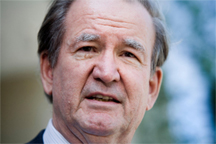Wayne Brown is a well-known Trinidadian writer and columnist who now lives in Jamaica. This is the 31st in his new series on the Obama era.
Barack Obama’s historic and earth-shaking campaign for the US presidency last year left behind it many unforgettable moments: from the initial shock of his victory over Hillary Clinton in all-white Iowa, to the Reverend Wright (‘God damn America!’) affair and Obama’s great Philadelphia speech on race, to the startling, if short-lived, emergence of Sarah Palin as the new Republican superstar, to Obama’s stealing of those blood-red states, Indiana and North Carolina, out from under the nose of McCain on November 4.
Yet, eight to 18 months later, no one moment remains as vivid in this columnist’s memory as those white faces on an Arizona lawn, as (also on election night) McCain transfixed them with what commentators praised as a “fine, magnanimous” concession speech.
In fact, this column noted at the time, it was a cruel moment. “For they were simple people, these white people of the American heartland, and credulous. All their lives, knowing nothing of the world (how many could find France on a map, say?), they’d lived by simple certitudes. God made the world in seven days, some 5,000 years ago. America was The Greatest Country on Earth (‘USA! USA!’). White people were superior to Blacks, Hispanics, and other minorities, and constituted the ‘real’ America. The touchstone of a man’s manliness was his gun.
“And they’d believed the McCain-Palin demonization of Barack Obama, the ‘foreigner’ with the Muslim middle name, the anti-American terrorist-lover, the socialist. Yet here now was McCain, abandoning them to the bogey he and Palin had sown in their dreams, McCain preparing a way to show his face back in the dayworld of the US Senate, while they stared at him in terror and bewilderment.
“Some booed. Others clapped uncertainly. None knew what to do, really. A black devil had just been elected the next president of their country, and what could that mean except that they had lost their country, these people whose country, however purely fictive by now, 44 years after the Civil Rights Act, was the only world they thought they knew?
“They had lost their world. They had been used and now were being discarded; and, watching the shock, bewilderment and terror on those white faces in the Arizona night, you had to feel for them.”
Well! Strictly speaking, of course, you didn’t have to feel for them, as more than one acquaintance chastised the present writer at the time. Stupidity has never deserved, far less required, sympathy; and, socially and economically, those shocked white faces had long benefited at African-Americans’ expense from the racism that now simply could not comprehend the nightmare that had befallen those who harboured it: a black President of ‘their’ United States! (‘USA! USA!’ no more!)

Yet it seems important to recognize that the current frenzy of Obama-hatred among rightwing extremists is rooted in no less a real and all-consuming despair as that which immobilized McCain’s audience that night. Like Melville’s crazed captain’s hatred of the white whale, like Ahab, of whom we’re told, “All that most maddens and torments; all that stirs up the lees of things; all truth with malice in it; all that cracks the sinews and cakes the brain; all the subtle demonisms of life and thought; all evil… was visibly personified and made practically assailable in Moby Dick,” so that Ahab “piled upon the whale’s white hump the sum of all the general rage and hate felt by his whole race from Adam down; and then, as if his chest had been a mortar, burst his hot heart’s shell upon it”; like that, the current hatred of Obama in some quarters is an emotion that has burst its bonds; that is about something far huger than Obama himself; and that “is out there in a scary place.”
Uneasily, we are entering the gloaming of pure libido. In the real world, there’s still no evident route by which such hatred would confound this column’s conclusion, eight months ago, that “the odds of some Alabama redneck with a rifle getting to Obama are vanishingly small.” Yet who can be sure that, past a certain point, the power of libido cannot create reality?
In the months before the assassination of John F Kennedy, the air of America was thick with poison.
Moreover, what no commentator has remarked to date is that, five months into his presidency, Barack Obama has emerged, not just as a hyper-active chief executive, but as a would-be moral force: a sort of American Gandhi. In speech after speech, at home or abroad, he has sought to appeal to the better angels of his audience’s nature. And when, as part of that moral scheme of things, he’s acknowledged America’s mistakes in the past, his rightwing critics have grown increasingly apoplectic.
Thus, in the wake of Obama’s Cairo address, rightwing commentator Pat Buchanan excoriated the President “because at heart he buys into the anti-American narrative that ours is a deplorable history – of genocide against the Indians, of slavery and segregation, of robbing Mexicans of their land and of disrespecting our Latin neighbours. Obama is determined to make the requisite apologies to show the world he does not condone the sins our fathers committed.”
Understand: to Buchanan, this isn’t admirable; it’s treason. He conveniently makes no mention of Obama’s many expressions of wonder at the virtues of America and of pride in his own American story.
Now, at the heart of Obama’s centrist leanings is his diagnosis that America, and the world, have both become impossibly polarized; that, in political arenas everywhere, hatred is so often the Muse that constructive action becomes impossible, whether in the US Congress or in the Israeli-Palestinian standoff, say; and that his essential task as president is therefore to assume the role of healer.
Yet recognizing the ‘Gandhi dimension’ (or the MLK or Bobby Kennedy dimension) of Obama’s presidency is troubling. Mandela was the happy exception; the world, history suggests, has a way of killing leaders who appeal not to its wallet but to its conscience.
Moreover, as detailed last week, the atmosphere, the language of opposition to Obama employed by the American right, is unprecedentedly rabid.
So it’s not just Obama’s race. It’s easy to imagine another African-American president, a Deval Patrick or a Michael Steele, say, settling down in the Oval Office to business as usual and not rocking the boat. Such a black president wouldn’t, one feels, excite the hatred that Obama has been exciting.
But Obama isn’t satisfied to be president. His ambition extends to wanting to change America, and change the world. And it’s apparent that he thinks he can’t do either without appealing to the consciences of those he would change.
And, obscurely but even more troublingly, that appeal further centres him in the crosshairs of those whose Muse is hatred.









